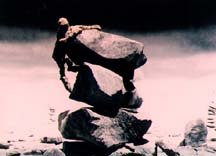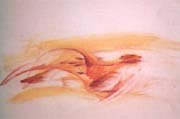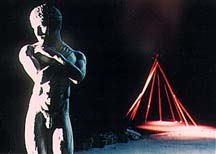Korea's AnimExpo is reviewed by Detelina Kreck who reveals a thriving, lively community.

First-timer AnimExpo `97 in Seoul, Korea was a success. The exposition was a spectacular domestic event, a commercial and cultural achievement. It was targeted at the general public, especially children, and included interactive games, popular animation characters starring on several stages, and big video walls showing the latest and most highly-rated Korean children's series. The main screenings took place in the Seoul Art Center situated in the heart of Seoul's entertainment area between the trendiest cafes, pubs and karaoke bars, a district of colleges and universities. Young people between 16 and 20 years-old queued up for hours to get a ticket, which is not surprising in a city of 11 million, especially after such a strong publicity campaign from main sponsor, the second largest television channel, MBC. The organizers reported a turnover of roughly $700,000 U.S. from the ten day exposition at the Seoul Olympic Park. Tickets cost $6 U.S. for children and $8 U.S. for adults. MBC said, "It is an enormous undertaking for economical and cultural development, bringing industry, international filmmakers and domestic audiences closest together." Besides MBC, other sponsors included, the Ministry of Trade, Industry and Energy, the Ministry of Environment, the Ministry of Information, the Korean Cultural and Art Foundation and the Software Industry Association.
The Awards

The International Jury awarded the Golden Damby Prize ($20,000 U.S.) to Oscar winner Quest, produced by Thomas Stellmach and directed by Tyron Montgomery, with worldwide distribution by Joachim Kreck Film, Germany, for its deep philosophical meaning and humanistic idea. The First Prize in the Ecology & Pollution Theme Category went to the German cartoon When the Wind Subsides by Serbian filmmaker Vuk Jevremovic. Special Prizes for outstanding films were given to: Limbo by Beriou (France); 1895 by Priit Parn (Estonia); Bavel's Book by Koji Yamamura (Japan); Jam the Housesnail by Tatsutoshi Nomura (Japan); l995 - 1995 by Paul de Nooijer (The Netherlands); a domestic commercial Hana Bank by Sun Woo Entertainment (Korea); and a debut cartoon, Mozaffar Sheydaei's Fish in Soil (Iran). All of these films shared the respectable amount of $100,000 U.S. The Merit Prize went to a Korean black & white cartoon Open by Dong Hee Jung, a gentle expression of the Jury's will to support domestic art films which are nearly non-existent. The UNICEF Prize was awarded to Mons the Cat by Piotr Sapegin (Norway).

Each Jury member (Kihachiro Kawamoto, Japan, Dan McLaughlin, U.S.A, Barbel Neubauer, Germany, Kyung Sup Shin, Korea and Yang Ding Xien, China) awarded their own Special Prize, a clever decision that neutralized the different artistic tastes of the jury. These prizes were awarded to: Yankale by Gil Alkabetz, Germany; Tale About The Cat and the Moon by Pedro Serrazina, Portugal; The End of the World in Four Seasons by veteran Dutch animator Paul Driessen, made at the National Film Board of Canada; Achilles by Barry J.C. Purves (U.K.); and Flatworld by Daniel Greaves (U.K.) ($2,000 U.S. for each). With three awards, Germany was the most successful international country for the first time and stole the show from the old animation bastion, the U.K. who has dominated the international animation scene for years.
Among 311 entries from 25 countries, the International Selection Committee (Taku Furokawa, Japan, Chris Robinson, Canada, Detelina G. Kreck, Germany, Erica Russell, U.K. and Kim Sae Hoon, Korea) selected 88 films for the main competition program. Only films without major awards from other festivals were allowed to compete, which led to a festival joke, kidding about "a festival of losers." Nevertheless, several awarded shorts were invited to attend the out of competition program.
Unique Korea
Never forget your business cards in Korea! In a strong hierarchical society everybody has to know their right place. Never say, "Mr. Kim and Mr. Lee called, please call back," because everybody's last name is Kim and Lee! You are welcome to enjoy your stay, but never complain. It's a bad omen, even worse than the number 4. You cannot find a 4th floor in a hotel or in a public building. They ignore it.

The organizing committee, managed by Daniel Lee, had to resolve a few problems. The primary one was obtaining permission from the local censors to exhibit erotic films and films with homosexual messages. It isn't easy to imagine how difficult a problem this can be for a more closed country with a traditional, structured society. You have to comprehend traditional Korean society and modern culture to understand that it is a matter of long historical development, of religious dogma forbidding even the slightest expression of pornographic or homosexual aesthetics in art. Korean society follows its own laws based on Confucian ethics which say that you have to be friendly to guests and "never lose face," which means answers like, "I don't know what you are speaking about," when asked uncomfortable questions.
Despite Seoul's heavy traffic, dominated by the domestic Hyundai and Daewoo cars, and local communication problems, the few international guests met a country of rapid economical and industrial development on all levels. It has a right to be called the rising tiger. Behind a few art films hides a powerful animation industry of big, professional studios which employ 650, 1500 or more animators, mainly female. They use self-made software and also perform a lot of hand-drawn animation. They specialize in hand-drawn animation because puppet, clay and other alternative techniques are not considered as trendy. A rich drawing tradition is the base for the elaborate skills of the young girls working in Korea. The working week is ten hours per day, six days per week. Nearly all major American television studios produce their shows in Korea. A few Europeans, like Le Studio Ellipse, also send their work to Korea. These studios are seeking good work at reasonable prices, and that's what they get for sure. It is worthwhile to invest money in this country. The product is of uncompromising quality. Whether or not this market stays stable is doubtful; the cold war between North and South Korea continues. One can smell it in the air. In two years time, the next Expo has ambitions to enter ASIFA, and to gain even more international grandeur and appeal.
Detelina Grigorova-Kreck is a producer, director and distributor based in Wiesbaden, Germany. She has served on a number of International Animation Festival Juries and Selection Committees. In the early 1980s, she was in charge of programs for the World Animated Film Festival in Varna.








